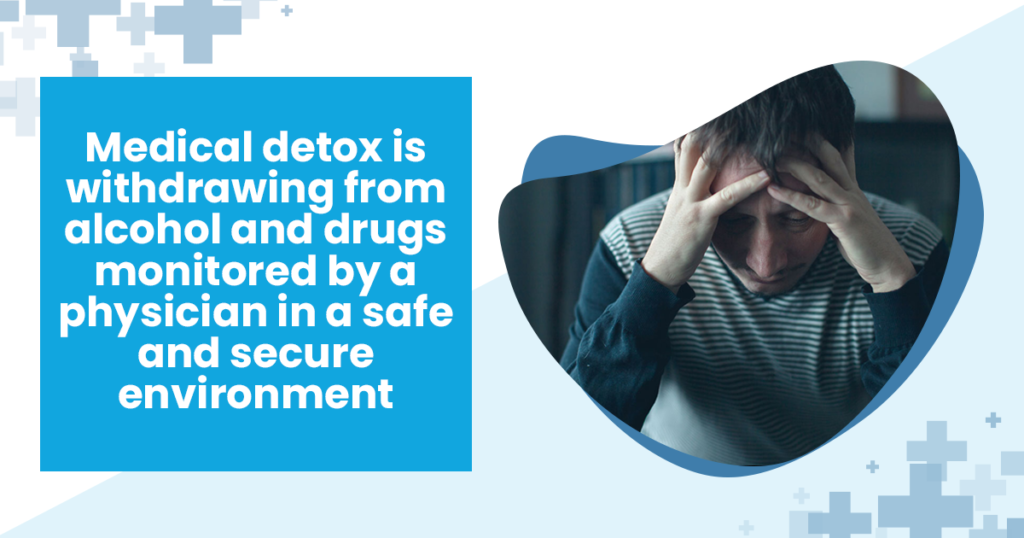
Medical detox is withdrawing from alcohol and drugs monitored by a physician in a safe and secure environment. Toxins like alcohol and narcotics are removed from a patient’s body through detoxification. Toxicity can be eliminated from the body over the course of days, weeks, or even months. The detox process will depend on the severity of the chemical. Depending on the medications involved, a doctor’s visit may or may not be necessary.
A detoxification plan is devised based on the toxins that a person has previously taken. Those addicted to opioids or opiates may require medication to stop taking the drugs safely. At a treatment facility, the medical staff monitors patients throughout the process to ensure no medical problems. From facilitating to initiating the first step of addiction treatment, detox can be incredibly effective in reducing withdrawal symptoms.
Focusing on the value of a customized strategy and individualized plans is essential. With the help of a team of experienced addiction specialists, this strategy can be applied in the best possible way to accomplish recovery.
In an inpatient detox during residential treatment, you will be screened for mental health disorders as well. Moreover, it may involve blood tests for a prior diagnosis. The clinical staff will examine a co-occurring disorder and advice ways to treat it in the addiction treatment.
What Makes Detox an Important Step of Treatment
Detoxification is only the beginning of recovery for those with substance use disorders (SUD). It is required for people to go through detox because it can ease symptoms of withdrawal and cravings in the long run. With less of a substance in your system, the less your body will crave and feel withdrawal from it.
Medical Detoxification Involves Careful Practice
A customized treatment program will depend on the severity of the addiction, the patient’s health, and the type of substance they are addicted to. Whether you are receiving outpatient or residential treatment also plays a significant role in how your treatment program will be planned. An outpatient program is designed for patients with a busier schedule who need flexible hours for recovery, while residential treatment involves the patient living at the facility and receiving around-the-clock medical supervision.
A Medical Detox is Helpful Towards Withdrawal Symptoms
Attempting to treat an addiction with alcohol or drugs still in your system can make it incredibly difficult to keep from relapsing. This is because of the painful withdrawal symptoms that can even be lethal depending on the severity of the addiction and the substance. Without medical care and guidance, an individual is more likely to continue using the substance to avoid feeling uncomfortable.
For the purpose of reducing withdrawal symptoms, medical detox is the best option. Any such drug or alcohol dependence could be lethal to well-being.
The symptoms of withdrawal include:
- Delirium tremens
- Irritability
- Tiredness
- Headaches
- Dysphoria
- Sweating
- Tremors
- Blood Pressure
- Body temperature rise
Hospitalization may be required in extreme cases to monitor the patient’s signs. A detox will be able to assure their safety. Many medications are used for the treatment of withdrawal symptoms.
- Alcohol withdrawal symptoms are relieved with benzodiazepines and other medications
- Anticonvulsants and antiemetic medications are used to treat seizures and nausea
- Following the acute detoxification phase of abstinence from alcohol, Acamprosate can help stabilize. The brain chemistry (usually combined with psychotherapy or similar treatment)
- For example, mixing alcohol with Disulfiram can lead to unpleasant side effects.
- Alcohol can lead to diseases like diabetes and hypertension. Additional treatment and medication are necessary to reap maximum effects
Frequently Asked Questions
What does detox mean in medicine?
Detox involves ridding the body of a substance an individual has been abusing. The process aims to reduce withdrawal symptoms and cravings for a smoother recovery process with less likelihood of relapse.
What is involved in detox?
In a detox, all traces of alcohol, drugs, and opiates are taken out of your body, ensuring you get physically stable and receive further addiction treatment.
How long does it take to detox your body?
Detoxing generally takes up to 10 days, but depending on the severity of a person’s substance abuse, the duration can vary accordingly. In severe cases, it can take several weeks or months.
What are the benefits of medical detox for alcohol addiction?
Medical detox for alcohol addiction can make the recovery process significantly easier. This is because the less substance inside the body, the less severe cravings and withdrawal symptoms will be, allowing for an easier recovery.
The Haven Provides Premium Medical Detox
Our thorough detox methods at The Haven can significantly improve the recovery process and make the entire experience less overwhelming. After detox, we provide effective behavioral therapies that identify and address problematic thoughts or behaviors contributing to alcohol or drug abuse.
A counselor will then help the patient replace these thoughts and actions and learn healthier ways to cope with daily life’s stress and anxiety. Our residential program has helped hundreds of patients overcome their addiction and prevent future relapses.
When you are ready to receive treatment for your addiction, call us at (561) 328- 8627 to learn more about our services.